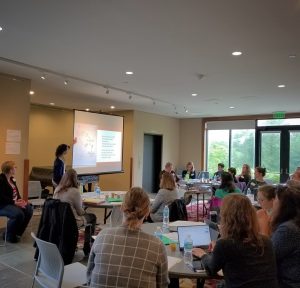Aug
02

Posted by Martha Meacham on August 2nd, 2017
Posted in: Communities of Interest, Instructional Design, Trainings
Tags: Community of Interest, Instructional Design, professional development, Teaching, workshop
This post is the second in a series about the event Teach me to fish: From instructors to teachers as science and health science librarians that was held on June 6th, 2017 at the Tower Hill Botanic Gardens in Boylston, MA. Hosted by NER’s Instructional Design Community of Interest, this day long, interactive work shop was taught by Dianne N. Brown, the Social Science Research & Instruction Librarian at Tisch Library, Tufts University, and Megan Bresnahan, the Life Sciences and Agriculture Librarian at the Dimond Library, University of New Hampshire. Below Megan offers her reflections on the workshop. Read the first post from Dianne here.
About the Instructional Design COI
As the role of many librarians have shifted from being collection focused to being instruction focused, the Instructional Design COI brings together librarians interested in developing and refining their teaching skills. The “Teach Me to Fish” Workshop was an opportunity for teaching librarians of all levels to further develop their teaching skills. This Workshop brought together the elements of well-designed session including creating a lesson plan, developing learning objectives, identifying active learning strategies (that support your learning objectives), and meaningful assessment. While this was just one program that the COI offered, additional programs and webinars will be offered that support the professional development needs of teaching librarians.
Reflections from Megan Bresnahan, Science Librarian

Megan Bresnahan leading the Teach me to fish workshop
The practice of librarianship in the sciences and health sciences often requires that librarians deeply immerse themselves in the context of the discipline and work to continuously expand their expertise of the areas in which their researchers and learners are working. Given the many complex roles for science librarians in supporting their users- offering services around research data management, author rights, fair use and copyright, measuring scholarly impact, evaluating publication venues, etc.- some librarians may find it difficult to also develop a focus on teaching. Additionally, subject or liaison librarian models in academic libraries may de-empathize functional role of teaching in favor of subject knowledge. Though most of us do, in fact, teach regularly, developing as a teacher may feel less urgent when so many other competing professional demands are present.
Adding to this issue, few library schools include a robust curriculum around instructional design and pedagogy. Librarians may enter their first library positions with minimal or no teaching experience. This issue is not unlike that experienced by teaching faculty at research institutions, who have been deeply immersed in a discipline and their research but perhaps not in the discipline of education. How do you work to develop as a teacher? What are the professional developments programs at your institution around teaching and learning for faculty? Can librarians participate in them? Do you have colleagues who have a background as educators? Does your institution provide funding for programs such as ACRL immersion, which has a reputation for being a transformative experience for teaching librarians but comes with a hefty price tag? Importantly, what unique expertise do we, as information professionals, bring to the classroom? What is our value as educators?
Local, free professional development opportunities for science and health science librarians who teach, like the “Teach me to Fish” Workshop, fill an essential spot in our continuing education, especially for those who have limited access to professional development and travel funding. It is important that librarians were able to reserve an entire day for thinking about their teaching practice, how teachers teach, and why we too, librarians, are teachers.
The Workshop was an active day full of conversation and practice. Participants seemed to enjoy applying the concepts presented by creating their very own lesson plans and learning activities.
Key Take-Aways from the Workshop:
We hope to hear how those who joined us for the Workshop use what they developed during the upcoming academic year. Dianne and I were so inspired by the wealth of ideas, especially related to active learning techniques and assessment strategies. We look forward to continuing the collaboration and future idea sharing!
~~ Megan Bresnahan
For more information about this specific workshop, contact Dianne Brown at dianne.brown@tufts.edu or @diannelibrarian on Twitter. Or Megan Bresnahan at megan.bresnahan@unh.edu.
For more information about the NER’s Instructional Design COI, please contact COI Leader Jessica Kilham, the School of Medicine Librarian at Edward and Barbara Netter Library, Quinnipiac University at jessica.kilham@qu.edu. Or Martha Meacham at martha.meacham2@umassmed.edu.